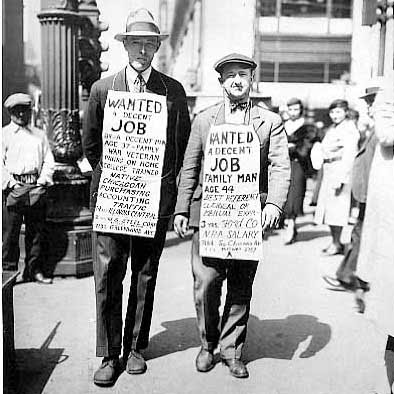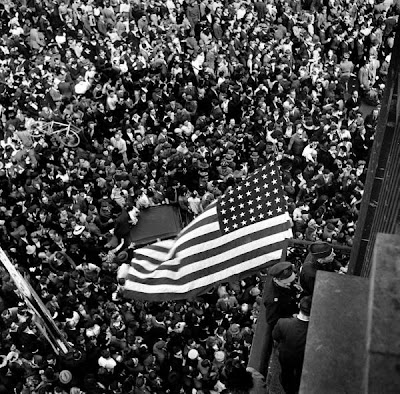
To This

Deficit spending is the method being tried to end the current recession. But deficit spending, without a method of repayment is a disaster in the making. We continually hear from the Left about the era of FDR and the plaudits accorded him by the Democrats. We also hear from the Right about how FDR did not help us out of the depression, but instead, WWII intervened and saved the day.
Can it be that both contentions are right? For my friends on the Right, I would tell them that as noble as the war effort was, it was still a gigantic government-spending project. The government transformed into one huge customer for every conceivable type of product. The purchases by the government sent unemployment down to 2% as factories manned up to produce the materials for war.
Neither the war nor the deficit spending effort by FDR was the saving grace for our economy though. Immediately after the war, we were in debt and the demand for war materials all but stopped. This put the people back onto the streets for a brief time. The war's aftermath really ended the depression. Instead of returning to the depression, as you would expect after the government stopped buying war materials, the war had created a pent-up demand for goods and services that were unavailable because of the war. Factories couldn't convert back to peacetime output fast enough to satisfy the demand.
This from --
http://eh.net/encyclopedia/article/tassava.WWII
"At a macroeconomic scale, the war not only decisively ended the Great Depression, but created the conditions for productive postwar collaboration between the federal government, private enterprise, and organized labor, the parties whose tripartite collaboration helped engender continued economic growth after the war. The U.S. emerged from the war not physically unscathed, but economically strengthened by wartime industrial expansion, which placed the United States at absolute and relative advantage over both its allies and its enemies."
Not only was the demand high domestically, but the United States was practically the only industrialized nation that was physically unscathed by the war. A decimated Europe, Japan, Russia, and England put the manufacturing ability of the United States in high demand. With her newfound status as supplier to the world, the United States was able to dig out from under the mountain of debt that had accumulated over the past two decades.
Large multi-national corporations evolved from the ashes of the depression. The United States became the economic juggernaut of the world.
When I declared that both the Left and the Right were correct with their statements, each only tells one-half of a story.
The government released wage and price controls after the war and enabled our industries to flourish once again as private enterprises. The Marshall Plan helped foreign economies and gave them the ability to purchase American goods. And G.I. plans helped the returning soldiers to purchase houses and to continue with their education. Another important piece to the puzzle was that the infrastructure of our industries was good because of the war effort. The war and its aftermath produced an almost perfect storm for an economic boom in the United States.
You can conclude that the war and its aftermath created the environment that gave us the ability to manage the deficits that we accumulated. But the conditions we face now do not have the same miracle attached to it as the conditions at the end of WWII. We are no longer the world's supplier of goods. Our export deficits, loss of a manufacturing base, and government regulations have made us into the world's largest debtor nation.
The U.S. today is akin to a man with his paycheck. His money has been spent and leveraged out with debt for many years to come. The U.S. is now facing debt as far as the eye can see. If we as a Nation do not get a handle on our economy soon, we will fail as a nation.
Cheers,
-Robert-
No comments:
Post a Comment
Please Include First Name and Town. -Thanks-